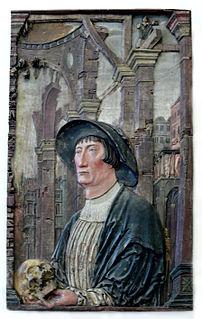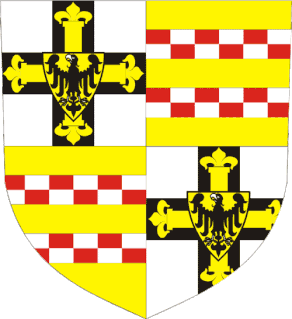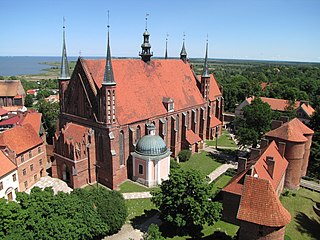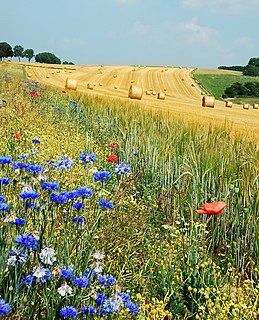
The Council of Constance is the 15th-century ecumenical council recognized by the Catholic Church, held from 1414 to 1418 in the Bishopric of Constance. The council ended the Western Schism by deposing or accepting the resignation of the remaining papal claimants and by electing Pope Martin V.

The Peace of Thorn of 1466 was a peace treaty signed in the Hanseatic city of Thorn (Toruń) on 19 October 1466 between the Polish king Casimir IV Jagiellon on one side, and the Teutonic Knights on the other.

Braniewo, , is a town in northeastern Poland, in the Warmian-Masurian Voivodeship, with a population of 18,068 (2004). It is the capital of Braniewo County.

Paweł Włodkowic was a distinguished scholar, jurist and rector of the Kraków Academy who defended Poland and native non-Christian tribes against the Teutonic Knights and the crusading movement in general.

Lidzbark Warmiński is a town in the Warmian-Masurian Voivodeship in Poland. It is the capital of Lidzbark County.
Lucas Watzenrode was the maternal grandfather of Nicolaus Copernicus.
Johannes VI Ambundii, Archbishopric of Riga 1418-1424, secular name Johannes Ambundii de Swan, also Abundi, Ambundij, Habundi, Habendi, Habindi, Almanni and ~ von Schwan was a German ecclesiastic. Ambundii is thought to be born in the area of Stettin (Szczecin) in Pomerania. He studied at the Juristical University of Prague, and graduated in 1391. Later, he got his doctor in theology and canonical law.

Tiedemann Giese, was Bishop of Kulm (Chełmno) first canon, later Prince-Bishop of Warmia (Ermland). His interest in mathematics, astronomy, and theology led him to mentor a number of important young scholars, including Copernicus. He was a prolific writer and correspondent, publishing a number of works on the reformation of the church. Tiedemann was a member of the patrician Giese family of Danzig (Gdańsk) in Poland. The Giese family ancestors originated from Unna in Westphalia, near Cologne. His father was Albrecht Giese and his younger brother, the Hanseatic League merchant Georg Giese.

Albert Suerbeer was the first Archbishop of Riga in Livonia.

Mauritius Ferber was a member of the patrician Ferber family. As Roman Catholic Prince-Bishop of Warmia (Ermland), he prevented most towns in his diocese from converting to Protestantism while the surrounding hitherto Catholic State of the Teutonic Order was transformed into the Duchy of Prussia and became the first state to adopt Lutheranism.
Johann von Tiefen was the 35th Grand Master of the Teutonic Knights, serving from 1489 to 1497.

Martin Truchseß von Wetzhausen zu Dachsbach was the 34th Grand Master of the Teutonic Knights, serving from 1477 to 1489.
The Hunger War or Famine War was a brief conflict between the allied Kingdom of Poland, and Grand Duchy of Lithuania, against the Teutonic Knights in summer 1414 in an attempt to resolve territorial disputes. The war earned its name from destructive scorched earth tactics followed by both sides. While the conflict ended without any major political results, famine and plague swept through Prussia. According to Johann von Posilge, 86 knights of the Teutonic Order died from plague following the war. In comparison, about more than 200 knights perished in the Battle of Grunwald of 1410, one of the biggest battles in medieval Europe.
Wartislaw VIII was a duke of Pomerania from the House of Griffins house. He ruled in Pomerania-Wolgast from 1394 together with his brother Barnim VI. After Barnim died in 1405, he ruled alone.

Anselm of Meissen was a priest of the Teutonic Order and the first actual Bishop of Warmia.

Johannes Hoffmann von Schweidnitz was a Roman Catholic theologian, Professor of Theology and Rector at both Prague and Leipzig Universities, and served as Bishop of Meissen from 1427 until his death.

Andrzej Łaskarz (Laskary) from Gosławic of the Godziemba coat of arms was Bishop of Poznań from 1414-1426, diplomat, doctor of rights, participant of the Councils, and reformer.






















